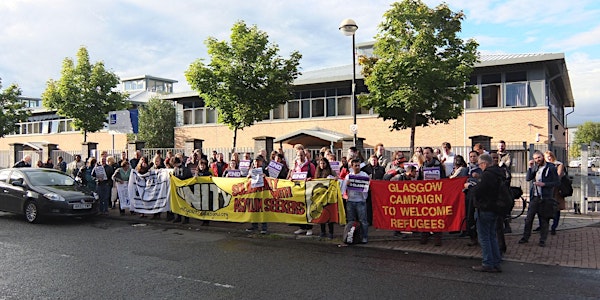
Mapping Immigration Controversy: Research Briefing
Date and time
Location
The Lighthouse
11 Mitchell Lane Glasgow G1 3NU United KingdomDescription
You are invited to a Breakfast Research Briefing to hear findings from the ESRC-funded Mapping Immigration Controversy project.
This will include short presentations of our research, the launch of a dissemination film, and reflections on the project and its findings from the research team and guest speakers:
Sunny Singh, Positive Action in Housing
Gary Christie, Scottish Refugee Council
Amal Azzudin, Glasgow Girls Campaigner and Community Worker
Chaired by Alison Phipps, GRAMNET
Coffee and pastries will be served. Please register to attend.
More about the Mapping Immigration Controversy research project
In July 2013, the UK Home Office launched a series of high-profile interventions aimed at directing public attention to an increasing ‘hard line’ from the government in controlling ‘illegal immigration’, including an advertising campaign which began in selected London boroughs calling on migrants with insecure legal status to ‘go home’; and a series of high-profile immigration checks and raids in public spaces in super-diverse areas, particularly in London, and similar publicity inside immigration centres in Glasgow and Hounslow. Summer 2013’s wave of interventions was part of wider structural change to the immigration service and policies restricting non-EU citizens’ entry to the UK, and their rights once present. Debate on migration and borders has continued to be important in the Scottish Independence Referendum campaign in September 2014, and the run-up to the 2015 general election.
Our research aims to understand the impacts of such policies and public debate on: migrants (both ‘legal’ and ‘illegal’); racially minoritised British citizens; community cohesion and good community relations; and political mobilisations.
We have conducted detailed research interviews and focus groups in six areas of the UK (Bradford, Cardiff, Glasgow, East London (Barking and Dagenham), West London (Ealing and Southall) and the West Midlands (Birmingham and Coventry)). We have also conducted a national survey in partnership with Ipsos-MORI, and interviewed policy makers and researched online debate. At the breakfast meeting on 15th April we will present our interim findings and discuss their relevance for politicians, policy makers and activists.
Understanding and informing policy-making processes
Policy makers and organisations working with migrants, against racial harassment, and on promoting peaceful communities need research which analyses the effects of these policies.
This research has been designed in collaboration with civil society organisations which have been clear about their needs for robust social scientific evidence that will help them and others to effectively foster good relations. The research design is based on needs identified by these groups and will also provide insights into wider questions of how public policy decisions are made and interact with public debate and social science.
Robust social science research
This project is funded by the Economic and Social Research Council, the UK’s leading research and training agency addressing economic and social concerns. It is one of the first projects to be funded under a new scheme, the ESRC Pilot Urgency Grants Mechanism, which enables social scientists to conduct research which responds quickly to urgent or unforeseen events. Our proposal was successful because it met the high standards of excellence required by the Research Council, in terms of methodology, planning, and the intellectual and social impacts the research is expected to have. The team of eight investigators have between us a wealth of experience and expertise in relevant fields, which we bring together with close working with local community organisations and national civil society partners who are also shaping the research.
Research Team
The project is led by Dr Hannah Jones, Assistant Professor in the Department of Sociology, University of Warwick, with seven co-investigators:
- Professor Gargi Bhatacharyya, University of East London
- Dr William Davies, Goldsmiths, University of London
- Dr Sukhwant Dhaliwal, University of Bedfordshire
- Dr Kirsten Forkert, Birmingham City University
- Dr Yasmin Gunaratnam, Goldsmiths, University of London
- Dr Emma Jackson, Goldsmiths, University of London
- Dr Roiyah Saltus, University of South Wales